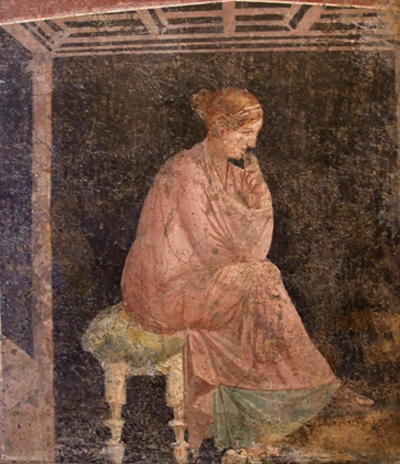
Fresco of a seated woman wrapped in a palla, from Stabiae

Although she is spoken of only obliquely, in the third person and as mea puella, Lesbia is clearly the focus and the target of this artful and highly charged poem. Whether or not she can be identified with the aristocratic, self-indulgent caricature of Cicero's Pro Caelio, Clodia Metelli, Catullus engages in this poem with an impressive Roman woman of wide experience in life and literature. The complexity and subtlety of the poem are a tribute to Lesbia's sophistication and wit, evidenced by her conciliatory approach to a hostile lover cloaked in the guise of a vow to the love gods. While Lesbia's original communication (probably a private letter) doesn't exist, it seems certain that Catullus quotes her accurately, particularly her carefully worded phrase electissima pessimi poetae scripta (lines 6-7), as he plays on its ambiguity to his own advantage. While reconciliation with Catullus appears to be Lesbia's goal and the termination of his iambic invective attacks (such as the scathing Carmina 37) only a means to ensure it, it is equally possible that the reverse is true and she is guilty of manipulation. The poet, on the other hand, makes his response to her on purely literary grounds, never broaching the topic of their reconciliation. Lesbia's vow is a sly combination of religion, love, poetic assessment, and self-interested business practice which, Catullus says, she offers iocose lepide (line 10). While this poem is not one of the truces iambos to which Lesbia objects, it is no less passionate if more graceful and literate a response both to her and to the critics of the neoteric or "new" poets who prefer large epic poems on public themes in the rustic tradition of the early Roman poet Ennius (c. 239 -169 BCE). Carmina 36, at once compact, colloquial, personal, and attentive to poetic aesthetic, opens and closes with the same line that humorously proposes and triumphantly asserts Catullus' substitution of contemporary epic poetry for burning: Annales Volusi, cacata carta. The poem falls into two major parts: lines 1-10 introduce Lesbia's clever parody of a vow and her motivation, her judgment of him (pessimi poetae) balanced by his characterization of her (pessima puella); lines 11-20 contain a hymn to Venus, at once lyric, sardonic and erudite (non illepidum neque invenustum), which demonstrates that Catullus' poetry is decidedly not electissima pessimi poetae scripta. The meter is Phalaecean hendecasyllables, Catullus' most characteristic verse and one favored by the Neoterics (listen). For close analysis of this poem, see the article by Marsilio in the Bibliography.
nam sanctae Veneri Cupidinique
vovit, si sibi restitutus essem
5 desissemque truces vibrare iambos,
electissima pessimi poetae
et hoc pessima se puella vidit
10 iocose lepide vovere divis.
quae sanctum Idalium Uriosque apertos
quaeque Ancona Cnidumque harundinosam
colis quaeque Amathunta quaeque Golgos
15quaeque Durrachium Hadriae tabernam,
acceptum face redditumque votum,
si non illepidum neque invenustum est.
at vos interea venite in ignem,
pleni ruris et infacetiarum.
20Annales Volusi, cacata carta.
Click on the underlined words for translation aids and commentary, which will appear in a small window. Click on the icon link![]() to the right of the text for related images and information.
to the right of the text for related images and information.